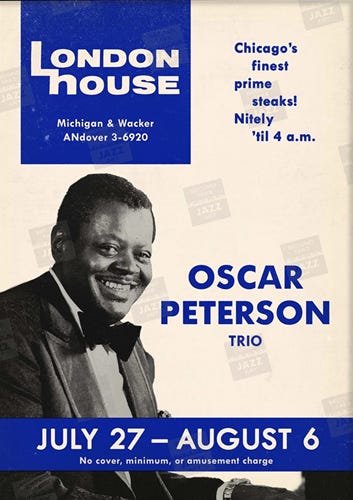The 100 Best Live Recordings - No. 96: Oscar Peterson, Joe Pass, & Niels-Henning Ørsted Pedersen: The Trio
No. 96 - The Trio (Pablo, 1973)
Among the folks that worry about such things, consider Art Tatum (1909 - 1956) and Bud Bowell (1924 - 1966) among the most technically proficient jazz pianist recorded. Easily in company with these men is Canadian pianist Oscar Peterson (1925 - 2007), who combined Powell’s bebop knowledge and acumen with the sheer technical command of Tatum. Peterson led several important piano, bass, guitar trios, including his long-lasting one with bassist Ray Brown and guitarist Herb Ellis (and guitarist Barney Kessel) in the 1950s.
In 1973, Peterson appeared at Chicago’s London House with bassist Niels-Henning Ørsted Pedersen1, and guitarist Joe Pass. Few jazz trios of the period, if not anytime, boasted such a meeting of rarefied virtuosity. In this performance, the trio showed a peerless grasp of the differing flavors of jazz, but it excelled beyond in the blues, three of which are included in the recording: the light speed “Blues Etude,” the monolithic monument “Chicago Blues,” and the subdued “Easy Listening Blues.”
What all three musicians can do is play at a furious tempo, often in the same song. “Blues Etude,” introduced by Peterson on his recording of the same name (Limelight, 1966) is an all-out race to play as many notes accurately as possible without losing the 12-bar flavor of the piece. Peterson’s “Chicago Blues” is a master class in ensemble blues playing and soloing. The lengthiest song on the recording, Peterson and company, take their sweet time exploring this timeless musical paradigm. It is a study in drama as expressed in the carefully constructed diminuendo-crescendo undulation. “Easy Listening Blues” combines the best parts of the two previous blues into a varied swinging piece illustrating the durable nature of the jazz subgenre.
The Duke Ellington composition, “Come Sunday” provides Joe Pass2 with solo recital space where the guitarist provides ample evidence of his commanding ballad style. Listeners and critics consider Pass “the Oscar Peterson of the jazz guitar.” The single ensemble jazz piece, Sammy Fain and Paul Francis Webster’s “Secret Love” closes the recording in style with a brisk and swinging reading. The entire recital at the London House would have contained much more music (what is here represents about a set’s worth. It would be grand to have a complete release of the entire show.
Niels-Henning Ørsted Pedersen (1946 - 2005) was a force of nature bass player, who could play with great verve (Looking At Bird (Steeplechase, 1981)) with Archie Schepp, or with great gravity and tenderness (Duo: Duke Ellington 100 (Storyville, 2020)) with Mulgrew Miller.
I encourage those who want to hear more superb Joe Pass playing to listen to Virtuoso (Pablo, 1973) and Chops (Pablo, 1979) with Niels-Henning Ørsted Pedersen.




